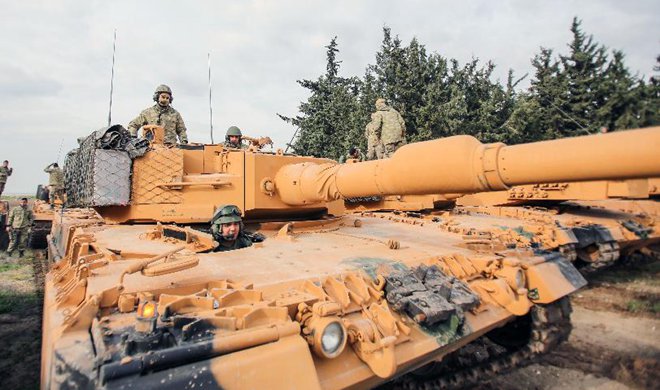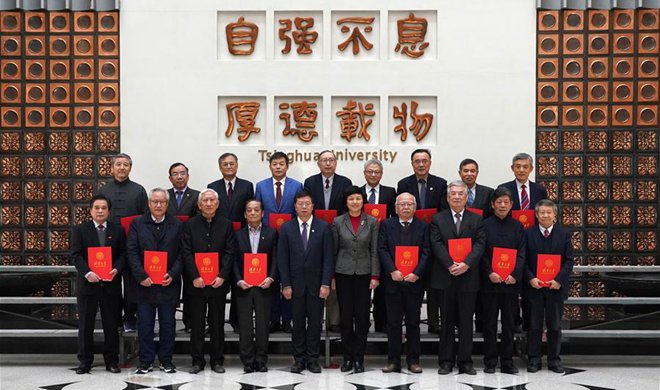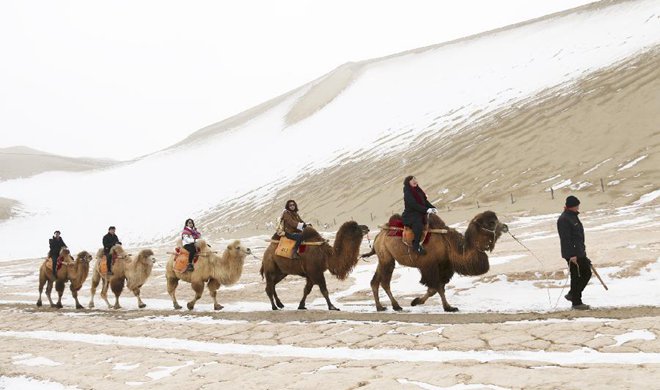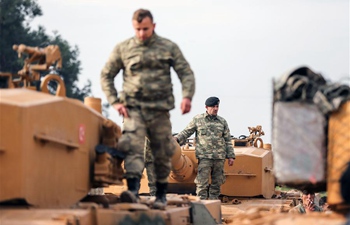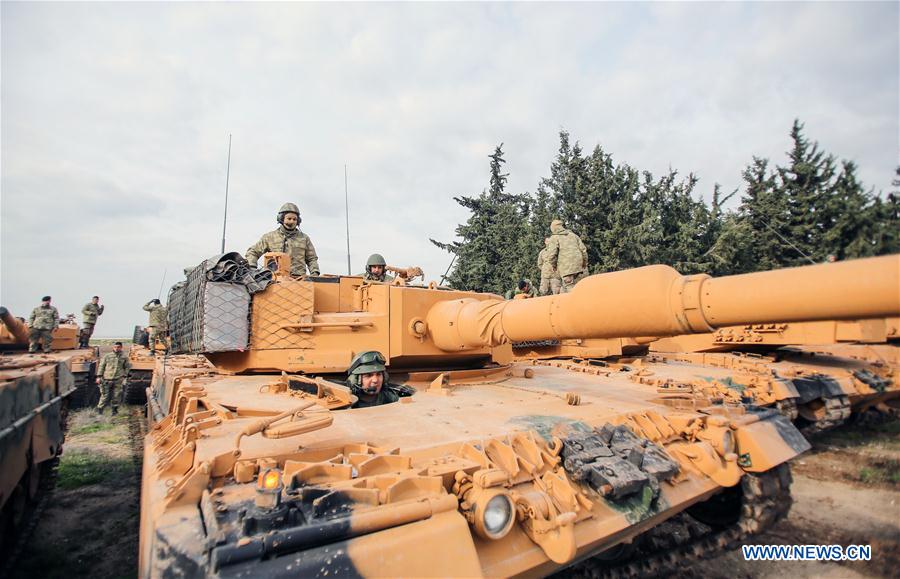
Turkish soldiers prepare their armored vehicles near the Syrian-Turkish border at Reyhanli district in Hatay, Turkey, on Jan. 21, 2018. Turkish ground troops entered Syria's Afrin Sunday on the second day of an offensive against U.S-backed Kurdish militia which should be wrapped up soon, said Turkish President Recep Tayyip Erdogan. (Xinhua)
DAMASCUS, Jan. 22 (Xinhua) -- A possible understanding between the Syrian government and the Kurdish fighters in Syria's northern enclave of Afrin could be conducive in bringing the Turkish military campaign against the Kurdish fighters in that region to an end, analysts say.
Ankara's military campaign against the Kurdish People's Protection Units (YPG) and other Kurdish-led groups in Afrin in the northern countryside of Aleppo province in northern Syria was triggered by the growing influence of the Kurdish fighters in that region near Turkey and also following the U.S. declaration that it was forming a 30,000-strong border force from the Kurdish-led groups, including the Syrian Democratic Forces (SDF).
Dubbed the "Olive Branch", the operation aims to eliminate the Kurdish forces in Afrin and in the city of Manbij, also in Aleppo countryside, all the way until the Iraqi border.
This technically means the end of the Kurdish dream of having a federal rule or an autonomy in northern Syria, simply because Ankara cannot tolerate such an entity in that region, with the YPG and its allies having the upper hand near its southern border because Ankara regards the YPG as a terror group due to its alliance with the Kurdistan Workers Party (PKK), branded as a terror group by Turkey.
Ankara started its campaign on Saturday with heavy shelling and airstrikes and announced Sunday the beginning of the ground incursion into Afrin along with its allies of the Free Syrian Army (FSA), with Turkish President Recep Tayyip Erdogan describing the campaign as a "national struggle."
All major powers demanded self-restraint and the need to spare civilian casualties, without strong opposition, despite the fact that the United States supports the Kurdish fighters and regards them as reliable allies to look after Washington's interests in the Syrian war.
Russia, which maintains good relations with the Kurds, had moved out its positions from Afrin while the Syrian government threatened military retaliation against the "Turkish aggression."
In short, the Kurdish fighters in Afrin have found themselves alone in this fight against Turkey, at least for now, with a YPG official announcing Sunday the beginning of a "revolutionary campaign against the Turkish enemy" and FSA.
Hmaidi Abdullah, a Syrian political expert, told Xinhua that the Turkish military campaign in Afrin constitutes an unprecedented turnout in the course of the Syrian war in that region.
However, he believes that if the Kurdish fighters and the Syrian government reached an agreement about the entry of the Syrian army into Afrin, the Turkish campaign could stop.
The reason is that Russia has been mediating between the Kurds and the Syrian government recently about the entry of the Syrian army to Afrin, but that didn't happen. And when Turkey was announcing its will to militarily interfere in Afrin, Syria's Deputy Foreign Minister Faisal Mekdad said his country would respond militarily, saying the Syrian air defenses have fully recovered and capable of shooting down Turkish warplanes over Afrin.
Abdullah said the Russians withdrew their positions from Afrin when the Turkish campaign started to push the Kurds into accepting to reach an understanding with the Syrian government and when this takes place, the Syrian army would enter Afrin and that won't be an easy fight for Turkey because the Syrian army represents the legitimate government of Syria, which is backed by Iran and Russia and those allies will not leave the Syrian army fighting the Turkish forces alone.
So there will either be a wide-scale war or an understanding between Iran and Russia on one side and the Turkish side, which doesn't seem to oppose the presence of the Syrian army near its border as long as the Kurds have no sway there.
Mahmoud Meri, the secretary-general of the oppositional Syrian Democratic Front, told Xinhua that the entry of the Syrian army into Afrin will pull the pretext of attacking that area from Turkey.
"The Kurds need to be wiser and to listen and sit on the negotiation table because the solution is within the framework of the Syrian state," he said.
What could hasten such agreement between the government and the Kurds is the location of Afrin as Turkey borders it from the north and west and it's adjacent to the city of Azaz, which is under the Turkey-backed rebels in the east.
So technically, Afrin has one way out connecting it with the capital city of Aleppo, which is only 60 km south of Afrin.
Ayham Muhammad, a journalist and political expert, told Xinhua "the message the Syrian government has delivered was clear that if the Syrian forces were on the ground in Afrin, they will defend it."
He added that there was a meeting between the YPG and the Russians recently, during which the Russians demanded the entry of the Syrian army to the Kurdish areas in order for the war to be averted, but the Kurds refused the Russian demand and stressed that they will defend the areas under their control.
Muhammad said the Turkish forces can achieve their goal because they have the upper hand in using warplanes to strike the Kurdish sites.
"So unless the Russians or the Syrian army interfere, the Turkish forces would advance, but if the Syrian forces entered Afrin, the entire equation would change," he added.











